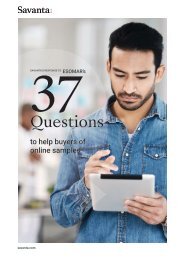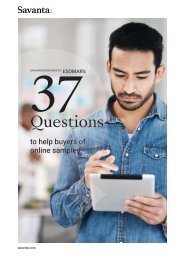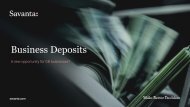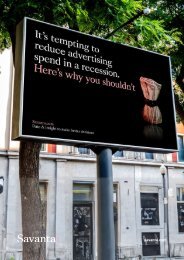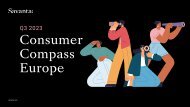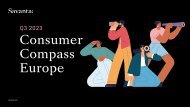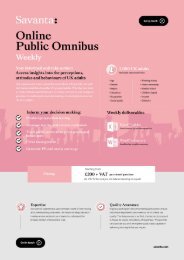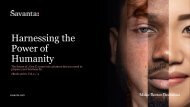Savanta DEI report 2023 v0
Create successful ePaper yourself
Turn your PDF publications into a flip-book with our unique Google optimized e-Paper software.
DIVERSITY, EQUITY, AND INCLUSION REPORT <strong>2023</strong><br />
Where do people experience<br />
discrimination?<br />
Education<br />
Healthcare<br />
Financial services<br />
Law enforcement<br />
The education system is supposed to<br />
give us the building blocks we need to be<br />
functional members of society, but 24%<br />
say they have experienced discrimination.<br />
Discrimination in education can hold<br />
people back from achieving their potential<br />
and leave them at a disadvantage.<br />
Prevalence was particularly high in the<br />
Muslim community (51%), and in the<br />
BIPOC communities across the UK and US<br />
(41%). A particularly concerning statistic<br />
given the Supreme Court’s recent decision<br />
to strike down the affirmative action<br />
policies at Harvard and North Carolina.<br />
25+25+25+25=<br />
One in four<br />
people personally<br />
experienced<br />
discrimination when<br />
they were in the<br />
education system<br />
Access to healthcare is critical for making<br />
us feel safe within our communities, but<br />
22% of those surveyed said they had met<br />
with problems.<br />
Those in the LGBTQIA+ community are<br />
again more likely to have had issues<br />
(32%), with 47% of those identifying as<br />
transgender, non-binary, or genderqueer<br />
experiencing some form of discrimination<br />
when it came to accessing healthcare.<br />
One in five<br />
people have had<br />
difficulty accessing<br />
quality healthcare<br />
Approximately one in five people have<br />
experienced discrimination when it comes<br />
to their personal finances – particularly<br />
when it comes to borrowing money, such as<br />
taking out a loan or mortgage. Being locked<br />
out of credit limits the possibility of home<br />
or car ownership and even the opportunity<br />
to start a business. This increases to 30%<br />
within the LGBTQIA+ community.<br />
An even stronger stance can be said for<br />
religious groups; An increased perception of<br />
financial service difficulty based on forms<br />
of discrimination for individuals who identify<br />
as Muslim (43%), spiritual people (37%),<br />
and other non-Christian religious groups.<br />
Evidently, discriminatory patterns when it<br />
comes to personal finances means curbing<br />
the ability to build generational wealth for<br />
entire groups of marginalized folks.<br />
Nearly one in four people believe they<br />
have been stopped by security or police<br />
unprovoked as a result of their ethnicity,<br />
sexuality, religion, or gender. With this<br />
experience, individuals have the potential<br />
to feel uncomfortable around those in the<br />
community who are there to protect them.<br />
This increases to nearly a third (32%) of<br />
those within the LGBTQIA+ community,<br />
and in the US, more than two in five (44%)<br />
amongst the BIPOC community.<br />
23+77+77+S<br />
23% have been<br />
stopped by law<br />
enforcement with no<br />
justification because<br />
of an aspect of their<br />
identity<br />
21% have had<br />
difficulty accessing<br />
financial services<br />
because of their<br />
identity<br />
// 4







